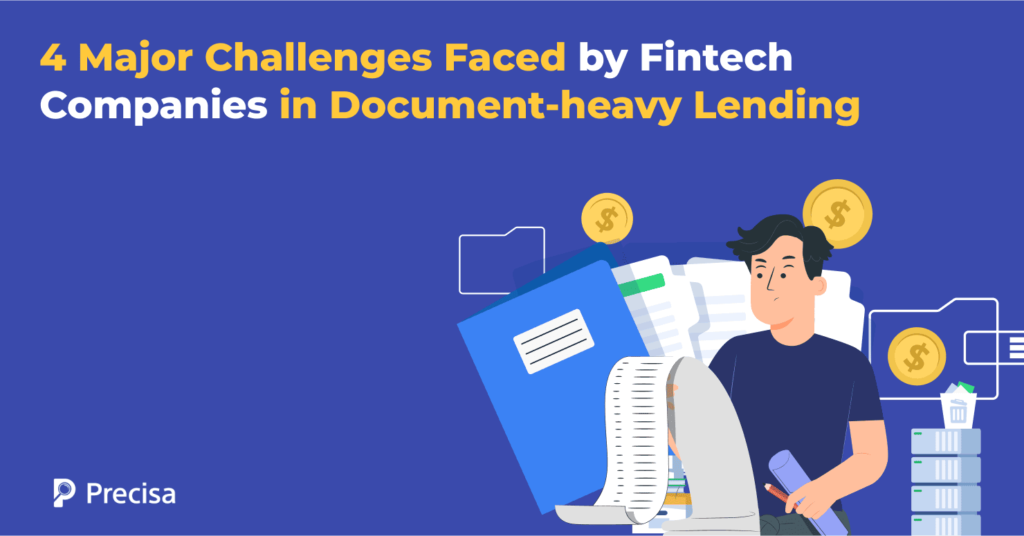Major Document Lending Challenges Facing Fintech Companies

Despite showing promising signs of revitalising Indian lending, the challenges faced by fintech companies are by no means insignificant. These generally include a combination of a complex regulatory framework, evolving operational guidelines by the Reserve Bank of India (RBI), and most importantly, document-heavy processes.
From Know Your Customer (KYC) documents and income proofs to property documents, fintech companies are swamped with documents, which often blocks their operational efficiency and ends up frustrating borrowers.
This article probes into some of the key challenges faced by fintech companies dealing with document-heavy lending processes. But first, let’s look at the mandatory documents required to complete a loan application in India.
Mandatory Documents Required for Loan Applications in India
The list of documents required for loan applications in India can vary depending on the nature of the loan (personal, housing, business, etc). These are some common and loan-specific mandatory documents required for loan applications in India.
Identity Proof
- PAN card
- Passport
- Aadhaar card
- Driving license
- Voter ID
Address Proof
- Passport
- Utility bills
- Aadhaar card
- Rent agreement
- Driving license
Income Proof
- Income tax returns (ITR)
- Salary slips (for employed individuals)
- Bank statements
- Profit and loss statements (business owners)
- GST returns (business owners)
- Business registration certificate (business owners)
Additional documents, depending on the nature of the loan, include:
For a home loan:
- Sales deed
- Sale agreement
- Property tax receipt
- Building plan
For personal loans:
- Identity proof
- Bank statements (last 3 months)
- Salary slips (for employed individuals)
- Balance sheets (for business owners)
Business loans:
- Identity proof
- Business registration
- Business address proof
- ITR
- GST returns
Major Challenges Faced by Fintech Companies in Document-heavy Lending
The irony in today’s financial space is that although fintech companies aim to digitise and revolutionise it, they struggle to navigate the document-heavy lending processes.
Here are some major challenges fintech companies face, particularly while processing document-heavy tasks:
1. Underwriting
Although underwriting is one of the most crucial stages of the loan origination process, it isn’t free from barriers. These include high operational costs linked to implementing collection and underwriting systems, a surge in loan applications from Tier 2 and Tier 3 Indian cities, and managing document-heavy workflows.
It can take lenders as much as 45-60 minutes to process each document manually. Now, imagine handling and processing a stack of documents. Steep document processing costs coupled with long customer wait times are some of the major problems that continue to hamper operational efficiency and customer satisfaction.
The solution?
Leveraging advanced technologies, including Artificial Intelligence (AI) and Optical Character Recognition (OCR), to accelerate document verification and scanning. These technologies play a key role in automatically detecting irregularities in financial documents and flagging compliance-related problems.
Further, these solutions are suitable for digital and physical lending documents, making them a top choice for new-age fintech companies and traditional lending institutions.
2. Handling Different Document Combinations and Volume Fluctuations
Fintech companies serve different types of businesses, including large enterprises to early-stage startups, catering to diverse financial requirements.
While some fintech companies primarily focus on facilitating retail loans, others prioritise commercial lending. Each lending instrument or service comes with its fair share of document processing challenges and requires a personalised approach to different workflows, including lending and risk assessment.
For instance, while fintechs focusing on retail lending predominantly deal with similar loan applications, those operating in the commercial lending space have to review and process non-standardised and complicated financial documents, leading to longer document organisation cycles.
However, advanced loan origination tools are equipped with document extraction systems that automate the classification and sorting of financial documents. Additionally, these automated document organisation systems are equipped to handle different document combinations efficiently and volume fluctuations, without hindering performance.
3. Data Extraction and Interpretation for Different File Formats
Among the top challenges faced by fintech companies—diverse formats. Generally, borrowers submit various lending documents in different formats, including PDFs, scanned images, and paper. Conventional loan origination and management solutions aren’t equipped to extract and integrate important application data across different formats, making it challenging for fintechs to organise and manage important customer data.
Data misinterpretation, particularly while reviewing and verifying documents manually, is another major roadblock, hindering the efficiency and credibility of fintech companies. However, the advent of cutting-edge data capture technologies is set to eliminate these barriers, paving the way for accurate and informed decision-making.
It is also worth noting that due to the nature of different loans, many loan documents include tailored and detailed terms and conditions which cannot be comprehended easily. However, advanced document management tools allow lenders to design standardised document templates with exceptional indexing and search capabilities.
4. eSigns Usage
While the RBI does not mandate borrowers and lending institutions to use physical paperwork, the adoption of electronic signatures or e-signatures hasn’t taken off in India due to trust issues, complex integrations, and other security-related concerns.
Although several lenders and financial institutions are gradually moving away from the conventional pen-and-paper system, digital signatures are often seen as risky even today.
There are a few reasons that fuel this thinking, as there have been instances wherein stakeholders in the lending cycle have denied the validity of e-signatures from certain platform providers.
Further, concerns over data protection and the genuineness of e-signs and the common notion to sign sensitive documents physically are other factors that dampen the adoption of e-signs in the lending space.
Parting Notes
While there is little doubt that India’s fintech ecosystem is flourishing, document-heavy lending processes continue to remain one of the major challenges faced by fintech companies today.
From processing different types of financial documents and loans, overcoming manual and error-prone underwriting, and navigating the evolving regulatory landscape, fintech companies need to stay on their toes to stay competitive.
The advent of technologies, including OCR and AI, will play a major role in addressing these challenges and aid fintechs in transforming India’s financial system.
Precisa offers a dazzling array of solutions that are designed to aid lending institutions and fintech companies in verifying and processing document-heavy lending processes. These include a bank statement analyser, GSTR analyser, and anti-money laundering analyser, each powered by cutting-edge technologies including AI.
Book a demo or opt for a free trial to simplify lending.




